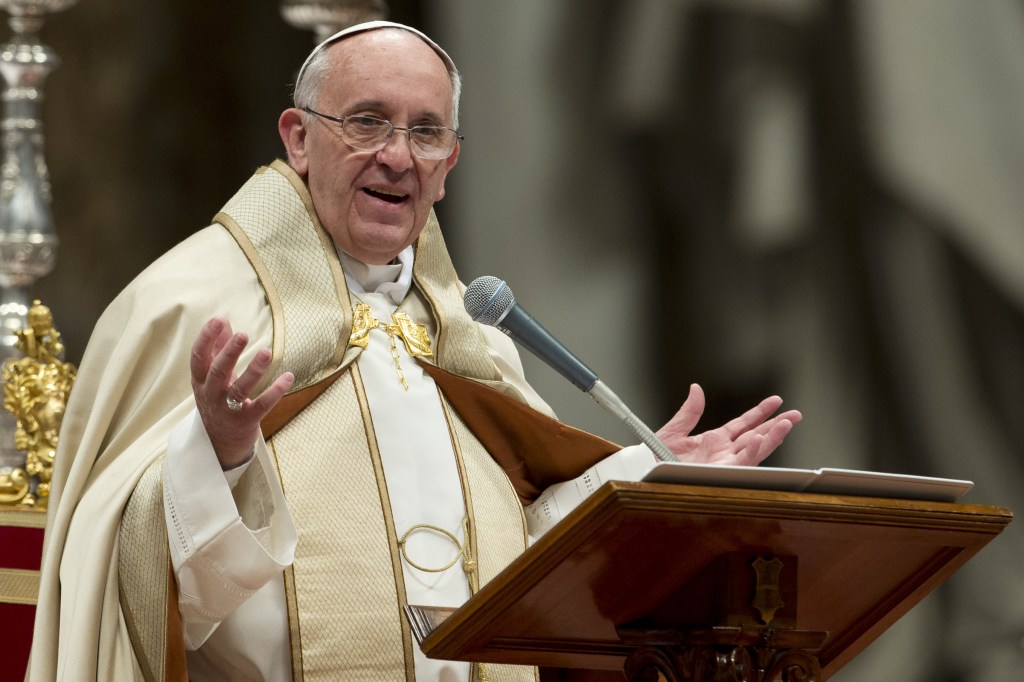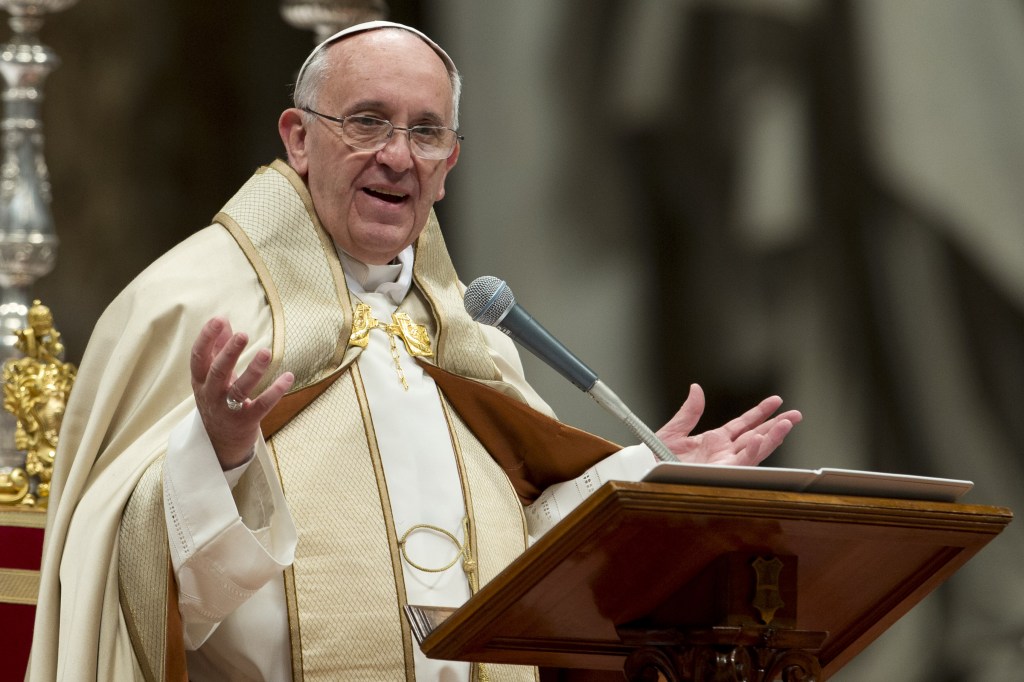Pope Francis on Tuesday sharply criticized growing economic inequality and unfettered markets in a lengthy paper outlining a populist philosophy that he says will guide his papacy as he pushes the Catholic Church to reach out more, particularly to the disenfranchised.
Using sharply worded phrases, Francis decried an “idolatry of money” and warned it would lead to “a new tyranny.” And he invoked language with particular resonance in the United States, attacking an economic theory most affiliated with conservatives that discourages taxation and regulation.
“Some people continue to defend trickle-down theories which assume that economic growth, encouraged by a free market, will inevitably succeed in bringing about greater justice and inclusiveness in the world,” Francis wrote in the papal statement. “This opinion, which has never been confirmed by the facts, expresses a crude and naive trust in the goodness of those wielding economic power and in the sacralized workings of the prevailing economic system.”
“Meanwhile,” he added, “the excluded are still waiting.”
While Francis has raised concerns before about the growing gap between the wealthy and poor since becoming pontiff in March, his direct reference to “trickle-down” economic theory in the English translation of his 50,000-word statement is striking.
The phrase has often been used derisively to describe a popular version of conservative or Republican economic philosophy that argues that allowing the wealthy to run their businesses unencumbered by regulation or taxation bears economic benefits that lead to more jobs and income for the rest of society. Liberals and Democratic officials have rejected the theory, saying it is contradicted by economic evidence.
The papal statement, known formally as an apostolic exhortation, is the first to be written entirely by Francis and discusses a wide range of topics, including the need for “broader opportunities for a more incisive female presence in the Church.”
Francis, who was elected to lead the church in March after the resignation of Pope Benedict, hails from Buenos Aires and became the first non-European to lead the church in more than a millennium.
Since then, he has been the subject of fascination and attention among many Catholics, political leaders and people all over the world as he has taken a decidedly more populist approach to the papacy. He has adopted a softer tone toward gays, eschewed lavish features of the papal lifestyle, washed the feet of convicts and repeatedly urged greater effort to lift up the world’s poor.
Francis’s focus on the subject is especially notable given dramatic changes in the world economy.
Many of the world’s richest countries are experiencing historic levels of income inequality, with the quality of the life for workers in the middle no longer improving.
And even in the developing world, there are emerging concerns about inequality and whether workers will benefit from their countries’ increasing prosperity. In China, for instance, officials have made repeated promises to tackle the country’s widening income gap.
It’s the “boldness and explicitness” of the pope’s new writing that makes it so newsworthy, said Michael Sean Winters, a fellow at Catholic University’s Institute for Policy Research and Catholic Studies.
“There’s no way a Catholic who is a serious intellectual can ever again not address the issue of income inequality, of the structural sins of our economic system. This is so front and center,” he said Tuesday. “He’s not saying âI’m an economic expert.’ This is a pastor’s voice. He’s saying, âif we’re serious Christians, we need to be knee deep in this stuff.'”
Around the world, Francis’s approach has won plaudits from many but also caused anxiety among some. President Obama last month said he has been “hugely impressed with the Pope’s pronouncements.” Conservative Catholics, however, have worried that his open tone is too unspecific and causes confusion on traditional teachings such as those against abortion and gay equality.
While Francis’ economic philosophy has yet to cause any major upheaval among conservatives, last year U.S. bishops and other prominent Catholics spoke out against a budget proposed by then-vice presidential candidate Rep. Paul Ryan, R-Wisc., that would have dramatically cut the safety net.
According to polling, U.S. Catholics are more supportive of government taking action to improve living standards and believe the wealth gap is historically high, but are divided over the size of government and whether the nation’s biggest problem is unfairness or over-regulation of business. In 2012, Catholics voters split on whether government should take action to reduce the gap between wealthy and less well-off Americans.
Helping the poor and combating inequality have been long tenets of papal statements and classical Catholic teaching, which supports carefully regulated markets and even a government role in redistributing wealth. While previous popes discussed the disenfranchised, they didn’t single out the issue the way Francis has.
Send questions/comments to the editors.




Success. Please wait for the page to reload. If the page does not reload within 5 seconds, please refresh the page.
Enter your email and password to access comments.
Hi, to comment on stories you must . This profile is in addition to your subscription and website login.
Already have a commenting profile? .
Invalid username/password.
Please check your email to confirm and complete your registration.
Only subscribers are eligible to post comments. Please subscribe or login first for digital access. Here’s why.
Use the form below to reset your password. When you've submitted your account email, we will send an email with a reset code.